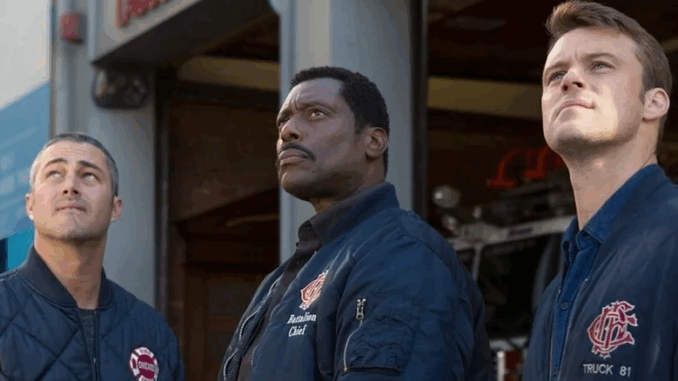
The Passing of the Torch: Why Chief Dom Pascal is the True Successor to Wallace Boden
For a decade, Firehouse 51 was defined by one man: Chief Wallace Boden. As the stoic, compassionate, and fiercely protective leader of the house, Eamonn Walker’s portrayal of Boden was the moral compass of Chicago Fire. He was more than a chief; he was a father figure, a confidant, and an unwavering symbol of integrity. His departure at the end of Season 12 was a seismic event, leaving a void that many fans feared could never be filled.
The show, in a bold move, didn’t rush to find a replacement. Instead, it allowed the characters to grieve and the narrative to breathe. A series of temporary replacements came and went, each one serving to highlight just how difficult it was to fill Boden’s shoes. But now, over a year after his exit, NBC has officially crowned its true successor: Chief Dom Pascal, played by the masterful Dermot Mulroney.
Pascal’s arrival was not a simple one-to-one swap. He is not a Boden lookalike or a tribute to his style. Instead, he is a new kind of leader, a man who is carving out his own path and, in doing so, is taking the show in a new and exciting direction. His appointment is a testament to the showrunners’ patience and their understanding that you don’t simply replace a legend; you find a new one.
The Problem with a Direct Replacement
When a beloved character like Boden leaves a long-running show, the natural inclination is to find a character who can step into the same role. But this is a trap that often backfires. A new character who tries to be exactly like the one they’re replacing can feel like a cheap imitation. The show ends up living in the shadow of its past, unable to forge a new identity.
Chicago Fire wisely avoided this pitfall. Instead of finding a new wise, fatherly figure, they introduced Dom Pascal. He is a by-the-book leader, a man who believes in order, protocol, and a clear chain of command. He is not a warm, emotional presence like Boden was. His leadership style is more professional, more detached, and more focused on the big picture.
This fundamental shift in leadership is a breath of fresh air for the show. For years, the dynamics of Firehouse 51 revolved around Boden’s moral authority. Every decision, every conflict, every moment of triumph was filtered through his perspective. With Pascal, the dynamics are different. The team is forced to stand on its own, to make their own decisions, and to navigate their conflicts without a father figure to guide them.
Pascal’s Challenge and His Success
Pascal’s first season was not an easy one. He was met with skepticism and resentment from a crew that was still mourning the loss of their leader. Characters like Stella Kidd and Kelly Severide, who had a deep, personal relationship with Boden, were particularly wary of the new chief.
But Pascal handled it with grace and a quiet confidence. He didn’t try to win them over with sentimentality. He won them over with his competence, his unwavering commitment to their safety, and his ability to get the job done. He proved that he was not an enemy but a new kind of ally, a man who respected their traditions but also had his own way of doing things.
His style is more of a collaborator than an oracle. He relies on his team’s expertise and respects their judgment. This has allowed characters who were once in Boden’s shadow to step up and shine. Characters like Stella Kidd have found a new voice, and the show’s focus has shifted from one central leader to a more collaborative, ensemble-driven unit.
The Return to a Grittier Narrative
Pascal’s arrival also coincides with a new narrative direction for the show. The show is now tackling more serious, real-world issues, like the political battles over funding for the CFD. As the show explores the threat of budget cuts and the possibility of firehouses being shut down, Pascal’s character is the perfect vessel for this storyline.
He is not just a leader of a firehouse; he is a political player who must navigate the treacherous world of City Hall. His dynamic with a new character, the Mayor’s Chief of Staff (played by Annabeth Gish), is a central part of the season. This adds a new layer of complexity to the show and proves that it is not afraid to evolve and adapt.
NBC’s decision to crown Pascal as the true successor to Boden is a bold and clever one. It shows that they understand the legacy of the show is not just about one man but about the strength of the institution. They are building a new foundation, a new kind of leadership that will take the show into its next decade.
In the end, Wallace Boden’s legacy is secure. He will always be remembered as the heart and soul of Firehouse 51. But Chief Dom Pascal is the one who will carry that legacy forward. He is a new kind of hero for a new kind of show, a man who is ready to lead a new generation of firefighters and to prove that even after a monumental exit, the show can not only survive but thrive. He is the true successor, and his arrival is a powerful statement about the future of the One Chicago universe.